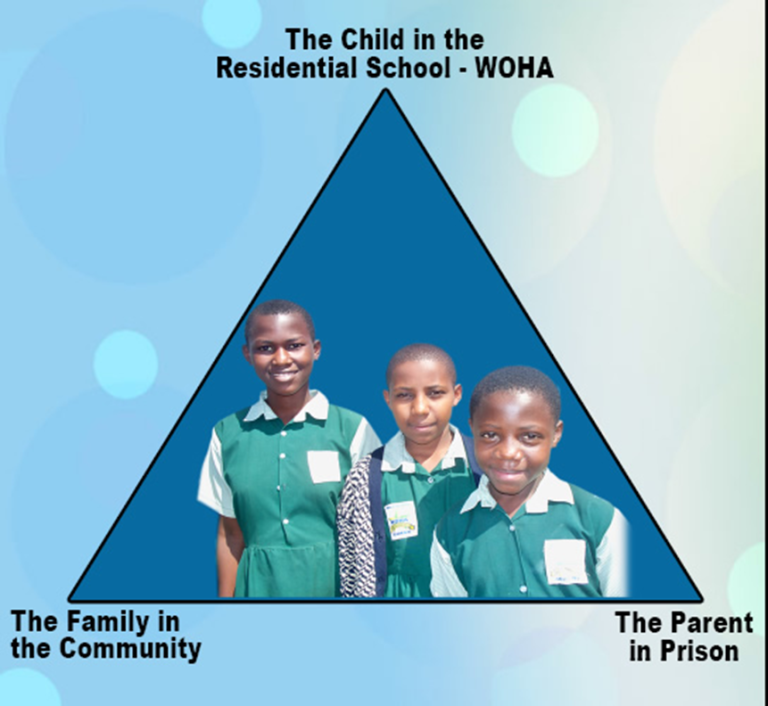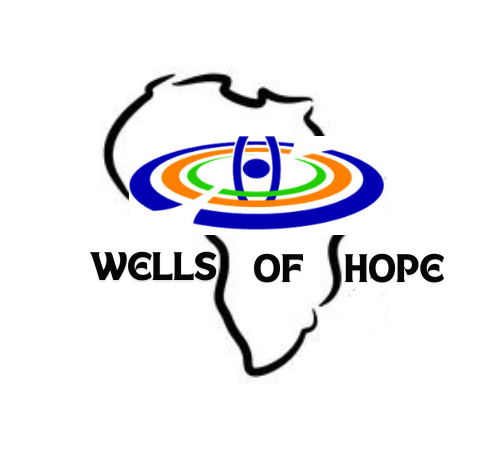Wells Of Hope Model
Wells of Hope Africa

THE ‘TRIANGLE’ OF THE CHILD, THE FAMILY AND THE PARENT IN PRISON
One of the key strengths of Wells of Hope is that it works with the triangle of the child’s life when a parent is in prison. By addressing the triangle of the child’s life the likelihood is that an impact is made on the difficulties outlined above.
The triangle can be expressed as follows;
Wells of Hope working with the different points of the triangle is not only crucial at the level of compassion and caring for vulnerable children.We know from international research that if relations are maintained between children and their parent when the latter goes into prison then there are higher chances of the prisoner not reoffending. This is particularly the case if the prisoner on release can return to a relatively stable family unit. This in part depends on contact and relationships being maintained while the parent is in prison also we know from international research that Children with incarcerated parents have an increased likelihood of offending. So interventions and support to the children themselves has a potentially beneficial impact on subsequent likelihood of offending.
THE CHILD IN THE RESIDENTIAL SCHOOLS
One of the caregivers will bring the child(ren) to Wells of Hope schools. At the school the children are provided with all the essential basics, of life, these will include Clothing, Food, Education, play, accommodation (A Bed and Blanket, Mosquitoes net, Bedsheets, and Mattress)Like Mentioned, three times a year these children are afforded an opportunity to visit their parents in prison. During the school breaks the children are supposed to be picked by their relatives and taken back home to spend time with family, but some children come from very far places or are at risk at home, so during the shorter breaks they will remain at the schools while their friends go home for school break. BUT we try to ensure that all children go home for the LONG Christmas break that starts in December and Ends in first week of February. Quite a number of children don’t want to go back to their homes because of personal safety concerns. the danger the communities pose to them .The Children appreciate the opportunity of schooling at free cost.Even at a young age the realized that without Wells of Hope they might not have had the opportunity of an education.The children were enthusiastic about their studies and they have ambitions for the future and hope to achieve rewarding jobs when they reach adulthood.They talk about the school representing safety for them. Wells of Hope a safe Haven for them away from a community that judges them, ostracizes and makes them pay for the crimes committed by their parents in prison.Because they come from relatively small communities (mainly either in the slums or in local village communities) the crimes of their parents are likely to have an immediate impact on their safety in their communities. Some of the children, if they stay in their own communities, are in danger of retaliation from other families who have been the victims of the crimes.
THE PRISONER WHO IS ALSO A PARENT
The Journey of helping the children starts with the parent in prison. For years Wells of Hope has been doing pastoral work in the prison, besides we provide high nutritive food to the people in prison living with HIV/AIDS, we provide HIV/AIDS Education and training of counsellors in the prison. This work that Wells of Hope does for the people in prison provides a trust that the parent in prison has with Wells of Hope. And this provides a platform to talk about their families especially concerning the children they left behind. We usually provide them a form they complete to apply to have their children provided helped, on that form they provide us with contacts and maps to the homes where they expect their children could be staying. Wells of hope enjoys a special privileged to be allowed access to the people in Uganda Prisons due to the good practice of the Open Door Policy of the Uganda Prisons.Wells of Hope facilitates the children to visit their parents in prison; three times a year they are transported on buses to various prisons where they are able to have a direct contact visit with their parents in prison. Because of the central role of Wells of Hope in maintaining their relationships with the children it is evident that the people in prison have a high regard for the personnel of Wells of Hope.
THE CHILD’S FAMILY IN THE COMMUNITY
Using the directions that the parent in prison provides on the application form, Wells of Hope volunteers go on to trace the children in the remote villages. The directions are usually not so clear, and because there are no proper addresses, it becomes a challenge to locate the homes. The emergency of phones has made easier the work of tracing but not all families have phones and some people in the prison have don’t know the phone contacts for their families or forgot them, so it makes the work so difficult, but with persistence and zeal, wells of Hope volunteers are able to locate the children, they could find them with a caregiver, who most of the time are grandmothers. This highlights the importance of the role of the grandmother in being responsible for the Children with incarcerated parents. A conversation with the family will lead to asking any willing caregiver to bring the child to Wells of Hope School. Sometimes Wells of Hope will assess if the child is safe in the family or if they are not by themselves, and Wells of Hope has witnessed many children headed families, usually the elder of the children looks after the others and these are really little children. In Such Cases Wells of Hope may remove the children and place them in Foster care or reunite them with a caring and willing caregiver.Because most of the people in prison are men and these were the breadwinners of the families, upon the father going into prison, the mother for economic survival embarking on a new marriage/partnership and the new husband /partner rejecting the child may abandon the child(ren). The responsibility for child care therefore often falls upon the grandmother (that is the mother of the father in prison) to look after the children and in some cases the children stay by themselves.Wells of Hope clearly has good relationships with the families of the children particularly the grandmothers. As an organization Wells of Hope gives them a sense of security and hope that when the parent comes out of the prison the family unit has a chance of surviving.
